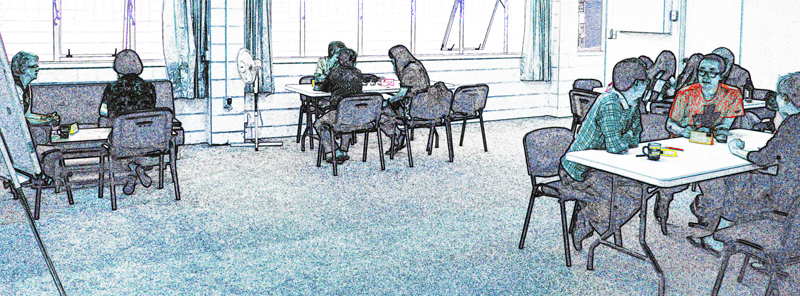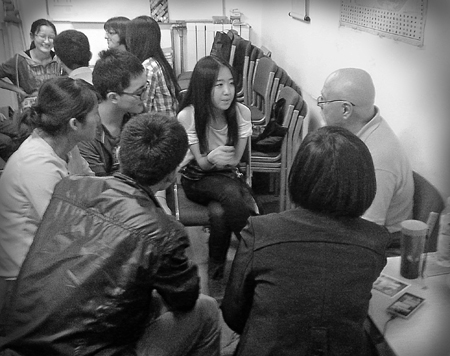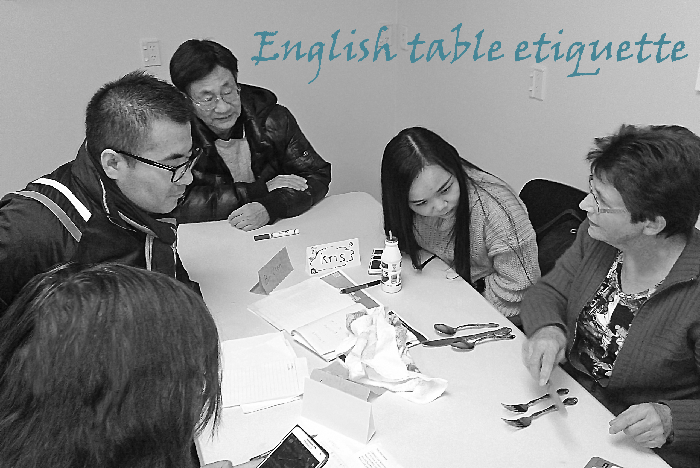

Language, Discussion, Culture and Friendship
Like gunpowder, printing and fireworks – English Corners were invented in China!!
They are often hosted by a university (student organised) but others are privately arranged in coffee bars and other venues.
They can be inside but are also held outdoors. In some places, an area is set aside for the English Corner and this will have permanent signage and even a list of rules! Some have become institutions like the one at Renmin University in Beijing which attracts hundreds of people every week.
Our Cultural Exchange Team in November will attend an English Corner in a public park in a large southern city which is officially supported by the City Government. They fund it!
Generally, English Corners in China, wherever they are held, continue to attract large numbers of people with a wide range of ages.
They are not dependent on having native English speakers though they tend to attract bigger crowds if there are regular foreign helpers.
The purpose of an English Corner is to give the participants as much opportunity as possible to practise English.
 Usually people form into small groups and engage in what is called “free talk.” Some English Corners may try to place restrictions on the topics – some prohibit talk about religion, politics and sex. This, however, is not always adhered to and free talk can be very free talk!
Usually people form into small groups and engage in what is called “free talk.” Some English Corners may try to place restrictions on the topics – some prohibit talk about religion, politics and sex. This, however, is not always adhered to and free talk can be very free talk!
Some groups may stay together or participants may move from group to group.
How they work.
The best English Corners provide topics which groups may choose to use. This is especially good if the English level makes free talk hesitant.
The topics can be written on a piece of paper or if indoors written on a white board.
It is also a good idea for the “teachers” to move around different groups.
Again, the best English Corners will control this. Participants will sit in small groups (4-5 is a good manageable number.) The “teachers will rotate every 20 minutes or half an hour to the next table.
It is good to have someone leading the English Corner, organising the teachers and ensuring that the groups are well balanced.
Videos
Some English programmes in New Zealand use the “tv news” format. The students work in groups but first watch an extract from the tv news. They can then discuss with their “teacher” what they saw, talk through any difficult vocabulary and then re-watch the news item (with by then greatly enhanced understanding)
This can also work well with well chosen video clips. These should be around 5-10 minutes long. A vocabulary list can be prepared in advance and the video discussed in the groups.
This is not strictly an “English Corner” which has “conversational free talk” as a basic principle.
In all these activities, the point is for the participants to do the talking – not for the “teacher” to give a lecture!
Good conversation starters or discussion points:
- What are your dreams?
If you got everything you dream, do you think you will be happy? - Do you think money alone can satisfy?
Do you know anyone who has everything and is not happy? - Are you ambitious?
What are your ambitions? - What is the biggest problem you are facing at the moment?
What do you think the biggest problem will be for you in the future?
What makes you most nervous? - What do you do in your free time?
- Do you think it is a good thing to volunteer and help others?
- What gives you the most satisfaction?
- Would you say you are contented with your life?
- What worries you most about growing old?
- Who is the happiest person you know?
- What is the point of living?
- Who is the most important person in your life?
- Natural disasters.
More complex topics.
- What is truth?
Is truth relative or absolute? - What is human nature?
Can it be changed. (Christians believe in the NEW birth) - Are science and technology the answer to the world’s problems? (The Four Modernisations: The Four Modernizations were goals first set forth by Zhou Enlai in 1963, and enacted by Deng Xiaoping from 1978, to strengthen the fields of agriculture, industry, national defense, and science and technology in China.)
- Why are delinquency, divorce, drug abuse and suicide rates so high in the so called “advanced” countries like America? (Note in some of these China is catching up!)
Is something more needed to solve these problems than science and technology? - What value has the individual?
Are people only gifted animals produced by blind evolution? - Is materialism true to reality?
Definition of materialism: .........................
- Philosophy The theory that physical matter is the only reality and that everything, including thought, feeling, mind, and will, can be explained in terms of matter and physical phenomena.
- The theory or attitude that physical well-being and worldly possessions constitute the greatest good and highest value in life.
- A great or excessive regard for worldly concerns

Other suggestions...
- How can we explain the reality of sacrificial love?
- Isn’t Christianity superstitious?
- What is the difference between true and false religion?
- Is not the Christian the true revolutionary? Christians are motivated by love.
- True Christians seek to make a positive contribution to society.. True or false?
- Christianity is really a Western religion isn’t it?
- A students words: “I am shocked to hear that people in the west believe in God despite the fact that science and the theory of evolution have disproved God. This is a material world so how can man have a soul??”
- Where do I look for God? In the realms of idealism or realism??
- If there is a God, why does he allow evil?
- Why are there so many churches? What is the difference between Protestants and Catholics?
- Why did God send Jesus as a Jew? Why not a Chinese, as our culture goes back thousands of years?
- First I need to make myself a better person, then I will become a Christian. Do you agree?
- Do young people in the west have empty hearts like we do??
Note: A form of atheistic evolution is still taught throughout the Chinese education system and will be reflected in many questions you are asked.
Subjects to “tread lightly with” in China and maybe in our own countries...
- Discussions about the PRC Government and/or The Party
- One child policy
- North Korea
- Japan
- International affairs
- The situation in Hong Kong
- Pollution
- Anything critical of China.
However, if these topics are brought up then be neutral and be careful they don’t get hostile. This is very possible, for example, when talking about Japan...
TIPS FOR TEACHERS.
- Give people time to answer.
- Don’t stray into “pidgin” English.
- Do use contractions. (Don’t say “do not” say don’t etc.)
- Three useful words – “tell me about” This will almost always produce an answer with a full sentence. “What did you do last night” is more likely to be answered with one word!
- Give people in your group time to think.
Ask the whole group a question and say “think about your answer” Give a little time to think then nominate someone to answer. - Using photos, leaflets, brochures etc is a good way to break the ice.
